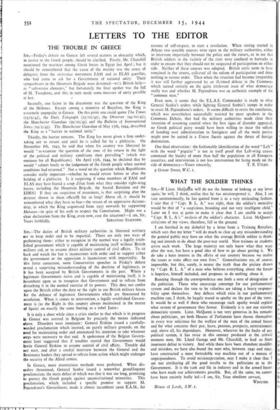Sta,—The duties of British military authorities in liberated territory are
to keep order and to be impartial. There are only two ways of performing them: either to recognise in the normal way a legally estab- lished government which is capable of maintaining itself without British military aid, or to assume direct military control of civil affairs. To sit back and watch the fun is inconsistent with order and to support either the government or the opposition is inconsistent with impartiality. In this latter connexion, some Conservative speeches in Friday's debate reveal a surprising misunderstanding of the doctrine of legitimacy, as it has been accepted by British Governments in the past. Where a legitimate Government exists and is capable of maintaining itself, it is Incumbent upon us to recognise that Government and to refrain from disturbing it in the normal exercise of its powers. This does notconfer upon the British either the duty or the right to use British military forces for the defence of legitimate Governments which are threatened by revolution. When it comes to intervention, a legally established Govern- ment is (as the Right in this country always maintained in the matter of Spain) on exactly the same footing as a rebel Junta : It is only a short while since a crisis similar to that which is in progress in Greece was averted in Belgium by precisely the means indicated above. Disorders were imminent: General Erskine issued a carefully- worded proclamation which insisted, on purely military grounds, on the need for maintaining order and announced his intention to take whatever steps were necessary to that end. A spokesman of the Belgian Govern- ment later suggested that if troubles started that Government would Invite General Erskine to assume control of civil affairs. Trouble did not start, and after a cordial interview between the General and the Resistance leaders they agreed to refrain from action which might endanger the security of the Allied armies.
In Greece, more ostentatious methods were preferred. When dis- orders threatened, General Scobie issued a somewhat grandiloquent proclamation, the main defect of which was that it was too long, promising to protect the Greek people against unconstitutional minorities. This proclamation, which. included a specific promise to support M. Papandreou's Government. made it almost incumbent upon E.A.M.. for reasons of self-respect, to start a revolution. When rioting started in Athens two sensible courses were open to the military authorities, either to intervene impartially between the police and the rioters, or to see that British soldiers in the vicinity of the riots were confined to barracks in order to ensure that they should not be suspected of participation on either side. Neither of these courses was adopted. British units seem to have remained in the streets, collected all the odium of participation and done nothing to restore order. Then when the situation had become irreparable it was still further aggravated by an ill-timed debate in the Commons which turned entirely on the quite irrelevent issue of what democracy really was and whether M. Papandreou was an authentic example of the "common man."
Even now, it seems that the E.L.A.S. Commander is ready to obey General Scobie's orders while fighting General Scobie's troops in order to resist M. Papandreou's orders. It seems difficult to resist the conclusion, which was nevertheless successfully resisted by most speakers in the Commons Debate, that had the military authorities made clear their intention of assuming control when the first signs of disorder appeaud, no Greek political party would have been willing to incur the odium of handing over administration to foreigners and all the main parties might now be united in a Union Sacree against the threat of foreign domination.
One final observation: the fashionable identification of the word "Left" with the word " popular " is not in itself proof that Left-wing causes command the loyalty of more than half the population in all European countries, and intervention is not less intervention for being made on the
side of democracy.—Yours sincerely, T. E. UTLEY. 9 Gower Street, W.C. r.


























 Previous page
Previous page